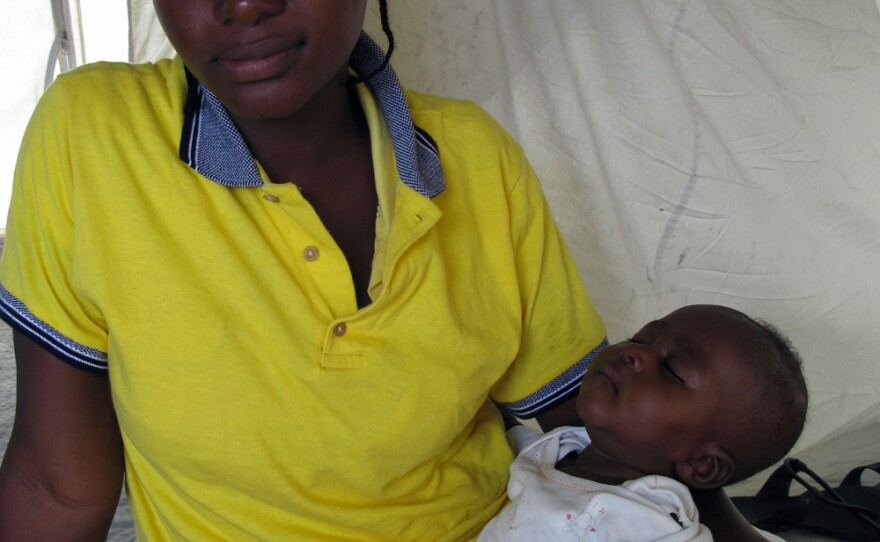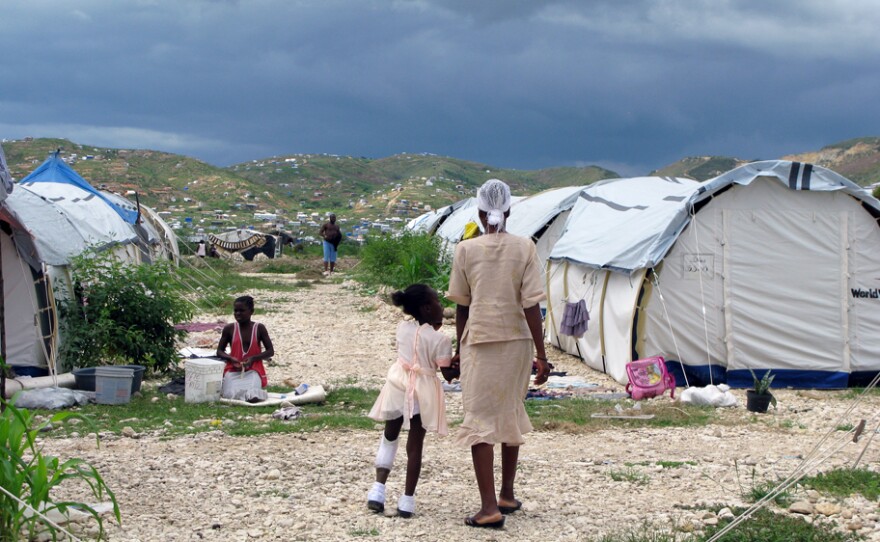Hurricane Tomas moved out over the Atlantic over the weekend. But last week, it skirted to the west of Haiti's capital, highlighting how vulnerable the earthquake-ravaged nation remains. Almost 10 months after the quake, more than a million people still live in makeshift camps. And even at one of the "better" camps, life is incredibly difficult.
At times I wake up, and all I do is sing or cry. When I cry, the baby cries and it makes me cry more. But each day there's really nothing for me to do here.
In the organized camp of Corail, set on a barren gravel plain to the north of Port-au-Prince, two sheets of cloth and a tarp are all that separate Ridlan Duvalier and her 4-month-old baby from the elements.
Duvalier's camp -- where 6,500 people live in long lines of white tents -- is considered one of the better ones.
Like most of the other residents, Duvalier was moved here in April from an incredibly overcrowded camp on a golf course.
She has left the camp twice since then, she says -- once to give birth in a hospital she doesn't even know the name of, and then again last week when she was evacuated ahead of the approaching Hurricane Tomas. Now she's back.

"At times I wake up, and all I do is sing or cry," she says. "When I cry, the baby cries and it makes me cry more. But each day there's really nothing for me to do here."
Duvalier is alone in the tent with her baby. Her boyfriend died in the earthquake. Her parents refused to take her in because she was pregnant, and she ended up with a friend at the golf course camp. They moved together to this camp. But just before she gave birth, her friend asked her to leave. So the camp managers gave Duvalier her own place.
The tent is barren. A few clothes are tossed in the corner. There are two buckets of water and a washbasin. Duvalier and her baby sleep on some blankets that she has laid on top of a piece of plywood.
"I only breastfeed my son," she says. "At times when I don't eat and I give him the milk, his belly swells up."
There's no food given out at the camp. With a newborn, Duvalier says, there's no way she can go into Port-au-Prince to seek work. So she relies on the kindness of her neighbors to eat.
Near Duvalier, a green army tent serves as a church. Women in their finest Sunday dresses stand in the dirt swaying to the hymns.
The preacher Charles Jean duMond says conditions in Corail are difficult for everyone, but they're particularly hard for single mothers.
"This is very common," the pastor says about Duvalier's situation. He says many single mothers end up having several boyfriends. He doesn't call it prostitution, but he says the boyfriends help the mothers survive financially.
A few tents up from Duvalier, 45-year-old Yvonne Antoine lives with three of her four children. Her youngest daughter, Louisemie, who is 5, lost her left leg in the quake.

But Antoine says her daughter's leg was the least of what their family lost. Her husband went insane, she says, because for days he believed his children were dead. Now his mother takes care of him out in the provinces.
Antoine lost her house and her job. Several of her nephews were killed. She also lost the ability to feed her children.
"When you're hungry, at least you can stay home and sleep," she says. "What's hard is when you think about these problems and you see all the barriers in front of you and there's no solution."
Antoine says she sporadically gets money from her oldest son who works in Port-au-Prince, and that's how they survive.
When she gets discouraged, she thinks back to the earthquake and to the fact that God saved her yet took so many others. This gives her strength to keep going, she says.
And across the camp, thousands of other residents keep going. One of Antoine's neighbors plays his guitar in front of his tent. Others have planted small gardens in the gravely dirt. Some people apparently settling in for the long haul have even planted fruit trees.
Copyright 2022 NPR. To see more, visit https://www.npr.org. 9(MDAzMjM2NDYzMDEyMzc1Njk5NjAxNzY3OQ001))







